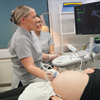As soon as you discover you’re expecting, one of the first questions you’ll likely have is: When is my baby due? This simple yet significant question can shape how you prepare for the months ahead. However, calculating your due date can be trickier than it seems. It’s not always straightforward, especially when it comes to using traditional methods like calculating from the first day of your last menstrual period (LMP) or pinpointing the date of conception.
Luckily, there is a more precise way to estimate your due date—early scans. In this blog, we’ll explore the different ways to calculate your due date, how early scans can provide more accuracy, and why they’re so important for expectant parents.
The Traditional Way: Using Your Last Menstrual Period (LMP)
The most widely used method for calculating your due date is based on the first day of your last menstrual period (LMP). This method assumes that you have a regular 28-day cycle with ovulation occurring on day 14. By adding 280 days (or 40 weeks) to the first day of your last period, your healthcare provider can estimate when your baby will be born.
While this method is effective for many women, it does have its limitations. As the NHS points out, the 28-day cycle assumption may not apply to everyone. If you have shorter or longer cycles, or if you ovulate later or earlier than day 14, this calculation can be inaccurate. Even if your cycles are regular, you might not remember the exact day your period started, further complicating things..
Additionally, this method doesn’t account for the fact that sperm can live for several days inside the body, meaning conception might occur after ovulation, complicating the accuracy of the estimated due date.
The Conception-Based Method
Another way to calculate your due date is by considering the date of conception. Since conception typically occurs around two weeks after the first day of your last period (during ovulation), this method can provide a more accurate estimation of your due date if you know exactly when you conceived. However, it’s often difficult to pinpoint the exact date of conception, as it depends on factors like when you ovulated and when sperm fertilised the egg.
For many women, especially those with irregular cycles or who were tracking ovulation, this method can be more accurate than relying on the first day of the last period. Still, even ovulation prediction methods aren’t foolproof, and the exact timing of conception can remain uncertain,.
How Early Scans Can Improve Accuracy
While the traditional methods of calculating your due date have their benefits, they don’t always provide the most accurate results. This is where early scans come in.
An early scan, typically performed between 6-14+6 weeks of pregnancy, uses ultrasound technology to measure the size of your baby and assess the gestational sac. These measurements are far more precise than relying on LMP or conception dates, especially in the early weeks. In fact, the NHS recommends an early ultrasound scan at around 8-14 weeks for expectant parents, as it can provide a much clearer estimate of how far along you are, even if you’re unsure about your last period.
For example, at Window to the Womb, we offer early scans from as early as 6 weeks. At this stage, we can detect the heartbeat, measure the size of the embryo, and use these measurements to determine how many weeks pregnant you are. This is far more accurate than calculating based on the LMP method, especially if you have irregular cycles or if the exact timing of your conception is unclear..
Why Early Scans Are Important for Expectant Parents
An early scan not only helps to establish a more accurate due date, but it also provides peace of mind. Here’s why:
- A More Accurate Due Date
Early scans are one of the most reliable ways to estimate how far along you are. They allow us to see the size of your baby and make a much more precise calculation than using dates based on your last period. If you’re unsure about when you conceived or have irregular cycles, this can make a significant difference. - Confirmation of a Healthy Pregnancy
One of the most reassuring aspects of an early scan is confirming that your pregnancy is progressing well. At 6 weeks, we can typically detect a heartbeat, which is a reassuring sign that your pregnancy is healthy. Additionally, we check for signs of a viable pregnancy, such as the presence of a gestational sac in the uterus. - Peace of Mind
Especially for first-time parents, seeing your baby on the screen for the first time is a special and emotional experience. It provides not only reassurance about the health of your pregnancy but also a tangible connection to your growing baby. - Monitoring Early Development
Early scans can detect potential issues such as ectopic pregnancies or signs of miscarriage. Catching these issues early gives you the best chance of appropriate care and intervention if needed. - Preparing for the Future
Knowing your accurate due date helps you plan for doctor’s visits, baby shopping, and maternity leave. It provides clarity on when to expect your baby, allowing you to make preparations well in advance.
When to Book an Early Scan
While the NHS recommends a scan at 8-14 weeks, booking an early scan as soon as you find out you’re pregnant—especially if you’re unsure about your dates—can offer several benefits. Our early scans are available from 6 weeks, which is the earliest time to see a heartbeat and get a clear indication of how far along you are. If you’re concerned about your due date, or if you’re simply curious about when your baby will arrive, booking an early scan can provide much-needed clarity.
For more information on early scans and to schedule an appointment with us, visit our website here.













 Packages & Prices
Packages & Prices  Important Info & Policies
Important Info & Policies  Your Scan
Your Scan